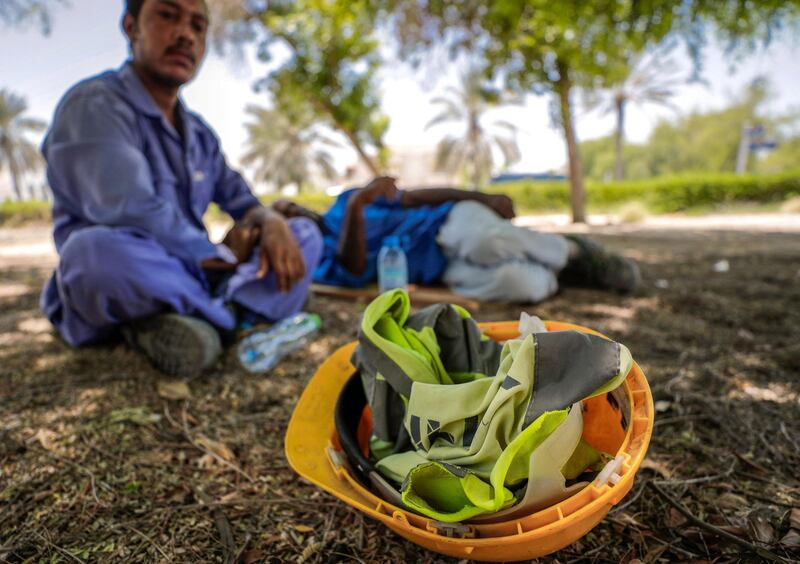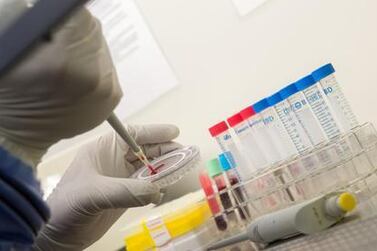Low-income workers without adequate health insurance for cancer care are relying on charities to negotiate discounts or pay their treatment fees in full.
Mandatory health insurance in Dubai covers cancer care up to Dh150,000 per year, but not all cancers are covered by the health authority's optional fund to top up cover.
Charities, such as the Cancer Patient Care Society – Rahma in Abu Dhabi, offer financial support to patients and some embassies have an emergency medical fund for its residents in the UAE.
Dubai Health Authority's Basmah initiative mandates insurers to make an extra Dh18 annual payment into a fund that is then used to pay for cancer patients' care. But it covers only three cancers – breast, colorectal and cervical – for low-income workers earning less than Dh4,000 a month.
Lung cancer treatment is expected to be introduced within a year under the additional insurance plan.
“Insurance cover for cancer is a work in progress, and developing all the time,” said Stephen Maclaren, a director at UAE health insurance brokers AES International.
“There is a priority to diagnose cancer as early as possible, with greater availability of screening programmes to improve patient recovery. A cancer diagnosed early – in stage one or two – gives an increased chance of survival and the medical insurance industry, working with clients, needs to move more into preventive medicine.”
According to the Department of Health Abu Dhabi, the five most common cancers in males are leukaemia, colorectal, prostate, non-Hodgkins lymphoma and brain cancer.
In women, breast cancer is the most common, followed by leukaemia, colorectal, thyroid and uterine cancer.
Lung cancer is the deadliest in men in the UAE, while women are more likely to die from breast cancer than any other.
Colorectal cancer is the second deadliest form of cancer in both sexes, and is one of the three conditions covered by the Basmah scheme in Dubai.
Patients who register for the Basmah initiative must go to a centre of excellence – currently that is Latifa Hospital – for treatment and insurers must opt patients in at the start of a cancer diagnosis. Cancer patient support programmes are administered by TruDoc Healthcare on behalf of the DHA.
"Currently, lung cancer and skin cancer are not covered under this policy," Mr Maclaren said. "This initiative aims to top up that basic health insurance cover, but only for the three listed cancers.
“Cancer treatment is often expensive and can incur considerable costs for insurers.”
Once the insured limit of care costs is reached, patients often then return home to continue their care, Mr Maclaren said.
Low-income workers are considered at high risk from some cancers, with those working outdoors in the UAE more vulnerable to skin cancer than others. Smokers are more likely to require treatment for lung cancer.
Charities can step in to support patients unable to pay medical bills for cancer, which can run into hundreds of thousands of dirhams for surgery and long-term care.
One such charity is the Cancer Patient Society – Rahma in Abu Dhabi.
A committee of doctors assesses each patient case to decide on eligibility for financial support.
A medical report is required to confirm a cancer diagnosis, while patients are means tested to assess their suitability for financial support up to Dh100,000.
“We try to help as much as we can,” said Ghada Al Jneibi, Rahma’s deputy director.
“Rahma can help with covering the cost of treatment, or seeking a reduced rate from hospitals in Abu Dhabi. “If someone is earning Dh20,000, for example, they can still get support if they can prove they have dependents and family costs.
“If they are not eligible, we can negotiate discounts on care with our medical partners at all of the government hospitals and most in the private sector.”
Screening for breast, cervical and colorectal cancer is now available on the mandatory health insurance package in Dubai, which all companies must offer.
Private hospitals regularly undertake free screening programmes to improve early detection of cancer and boost survival rates.
One of those success stories is the Zulekha Healthcare Group’s cervical cancer screening programme, Chance to Change.
In 2014, 282 women attended a check-up at the Sharjah Zulekha Hospital.
That number increased to 1,756 last year.
Low-income workers from the Philippines can also access a hardship fund if they have inadequate health insurance.
Paul Cortes, Consul General to Dubai and the Northern Emirates, said Filipinos can apply for financial support for cancer treatment from the assistance to nationals fund, although applications for medical support are rare.
“Very few people have requested help from the fund for cancer care, because most now have insurance,” he said
“Unless you are destitute, an illegal resident or undocumented and living in the UAE, we cannot step in to help as the medical insurance system covers most of these cases.
“The limit on applications to the fund is not defined, but it is offered on a case-to-case basis.”








